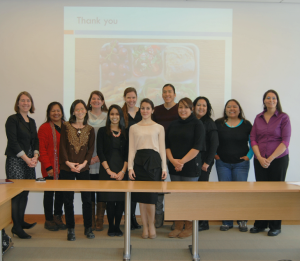By: Kristin Beharry (JD ’16) and Rosana Aragon Plaza (LLM ’15)
 Fundamental Navajo law includes the concept of ho’zho’, loosely translated to “balance.” In a workshop hosted by the Food Law and Policy Clinic (FLPC) from February 9-11, Navajo Nation food advocates described how their current food system is out of balance, leading to environmental, health, and economic challenges among its residents. Over three days, the Navajo advocates and FLPC staff and students talked through strategies to change laws and policies on the federal, tribal, state and local level to improve the food system and gain back this sense of balance. These discussions will play a key role in FLPC’s work to develop a toolkit that identifies the main food policy and advocacy challenges that the Navajo Nation faces today, and strategies to overcome these challenges through policy change. The FLPC has been working with the Navajo Division of Health for the past two years, exploring ways in which Navajo leaders can address health and food sovereignty challenges in the Navajo Nation through food policy change.
Fundamental Navajo law includes the concept of ho’zho’, loosely translated to “balance.” In a workshop hosted by the Food Law and Policy Clinic (FLPC) from February 9-11, Navajo Nation food advocates described how their current food system is out of balance, leading to environmental, health, and economic challenges among its residents. Over three days, the Navajo advocates and FLPC staff and students talked through strategies to change laws and policies on the federal, tribal, state and local level to improve the food system and gain back this sense of balance. These discussions will play a key role in FLPC’s work to develop a toolkit that identifies the main food policy and advocacy challenges that the Navajo Nation faces today, and strategies to overcome these challenges through policy change. The FLPC has been working with the Navajo Division of Health for the past two years, exploring ways in which Navajo leaders can address health and food sovereignty challenges in the Navajo Nation through food policy change.
In Navajo Nation, healthy food is often costly, difficult and time-consuming to find, while heavily processed, high-calorie and nutritionally poor foods are far more prevalent. The biggest Native American reservation in the United States, Navajo Nation includes large “food deserts,” defined by the U.S. Department of Agriculture as low-income communities that have “low levels of access to a grocery store or healthy, affordable food retail outlet.” Food insecurity is estimated to affect a staggering 76% of households in Navajo Nation. The lack of fresh, healthy food perpetuates health disparities, as over 40% of the total Navajo population (which stands at over 180,000 people) are overweight or obese.
How can these often remote, rural and low-income communities improve their access to healthy food and beverage options? And what role does law and policy play in improving the food environment?
During the workshop, FLPC staff and students discussed with Navajo food leaders the policies that affect the Navajo food supply at the tribal, local, state and federal level. The dialogue was helpful and constructive for both sides. FLPC members shared their knowledge of how to use law and policy to make positive impacts on health and food sovereignty, while Navajo advocates provided their unique insights as food advocates and as members of the community to which the toolkit is tailored. The discussions touched upon issues such as the interplay between Navajo, state and federal government, the infrastructure of the Navajo food system, healthy food access, federal and tribal food assistance programs, and school food in the Navajo Nation.
While the snow in Boston presented some challenges to touring the city, workshop attendees and the FLPC team were able to visit the North End and Copley Square neighborhoods for dinner, and participated in a tour of Harvard’s Peabody Museum of Archaeology and Ethnology, which features an extensive collection of Native American artefacts and art. On Wednesday, February 11th, some Navajo advocates led a presentation open to the public, describing their efforts to improve regional food systems in Navajo Nation by building upon community resources.
Lastly, representatives from the Harvard University Native American Program joined the workshop on the last day to describe resources around Harvard for the study of Native American issues as well as avenues for greater engagement between the Harvard and the Navajo Nation.
The FLPC team plans to visit our partners in Navajo Nation later this spring to learn more about their food system and lead trainings on how to advocate for better food policies in Navajo Nation.
To stay up to date on our work with Navajo Nation and FLPC’s other projects, follow us on Facebook and twitter.
————–
The views reflected in this blog are those of the individual authors and do not necessarily represent those of the Center for Health Law & Policy Innovation or Harvard Law School. This blog is solely informational in nature, and not intended as a substitute for competent legal advice from a licensed and retained attorney in your state or country.


Health Law & Policy, Commentary
Braidwood Management v. Becerra: Updated FAQs for Health Advocates and Providers
July 22, 2024